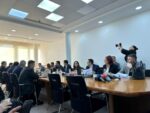Former senior KLA (Kosovo Liberation Army) officer and SHIK (Kosovo Intelligence Service) agent, Naim Miftari, has spoken about the situation in northern Kosovo, including the division and arming of Serbian criminal structures and groups.
He states that since 1999, the north has been filled with Serbian weapons, which, according to him, happened after the Kumanovo Agreement between NATO and the Serbian army.
According to Miftari, at that time, all Serbian military brigades were the last to withdraw from northern Kosovo. He adds that after the deployment of French KFOR (Kosovo Force) in that area, Serbian soldiers were deliberately slowed down, leaving weapons in the hands of Serbian criminals gathered from all over Kosovo, amounting to hundreds of thousands of weapons.
“It is no secret that even in some meetings between international forces and Serbian criminal civilian structures, which were supported by the French secret service DGSE, meaning the French military, the Serbs had opportunities to arm themselves. During these meetings, the Serbian criminal Oliver Ivanović and other Serbs threatened foreign administrators, saying they would level Mitrovica with 120 mm mortars if Serbian conditions were not met and if the Ibër Bridge was opened to Albanians,” says Miftari.
He states that even after the war, and still today, the military weapons are stored in churches, hospitals, clinics, cemeteries, and the weapons they needed to use were kept in specific sewage wells and abandoned or burned houses.
“The Serbian UDB (State Security Service) and MUP (Ministry of Internal Affairs), in cooperation with the French forces, the French KFOR, could bring other weapons that would replace those confiscated by the Danish KFOR. At that time, an AK-47 cost 35 marks, and later 50 euros for a Serb. This means that Serbian gangs and Serbian state criminal structures have never had a problem bringing in new weapons shipments, especially for the criminal structures in the north,” he adds.
Miftari claims that the International Community, NATO, UNMIK, G2 of the KLA-TMK (Kosovo Protection Corps), the Police, and SHIK were sent hundreds of thousands of accurate reports with photos and locations of where the Serbian gangs were hiding weapons, but the French army took no action and did not allow anything to happen.
“As for the current weapons being found, they were brought by people from UDB, BIA, from time to time through Žeravnica and the Banjska Monastery, certainly in close cooperation with the Hungarian KFOR. According to our information, a group of Hungarian KFOR officers several times brought weapons by KFOR trucks, which were later distributed sometimes in ambulances and sometimes in Kosovo Police vehicles in the north, since most of the Serbian police officers in the north were former criminals of the bridge guards and reported to Belgrade, even though they wore uniforms and received salaries from Pristina, from former corrupt governments that allowed and even planned the division of northern Kosovo with Serbia,” he says.
Miftari expresses that this dirty policy of smuggling, betrayal, drugs, cigarettes, oil, etc., functioned perfectly from June 1999 until 2021, when Albin Kurti’s government was elected, which, according to him, faced much sabotage from within, organized by the corrupt post-war rulers from the PDK-LDK and AAK-AKR and from the Serb List.
“The Government of Kosovo was sabotaged by organized crime closely linked with politics, for example, it was sabotaged in key security and law institutions: like the police, customs, judiciary, and KIA (Kosovo Intelligence Agency)… but things, nevertheless, have now begun to fall into place even though the Kurti Government has not yet managed to thoroughly clean the police, judiciary, prosecution, and KIA. Regarding sovereignty in the north and the rule of law, Kosovo should not always ask the internationals, just to fulfill their wishes. We have noticed many times that even the majority of those we consider international friends are siding with the Serbs, forgetting that Kosovo is a sovereign state,” concludes Naim Miftari.







